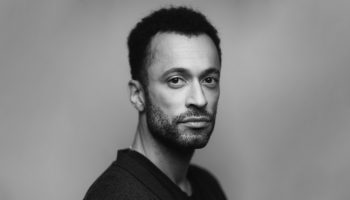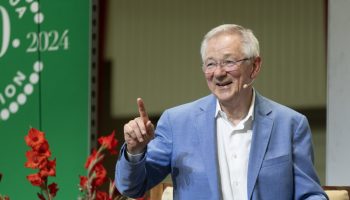MAX ZAMBRANO – STAFF WRITER
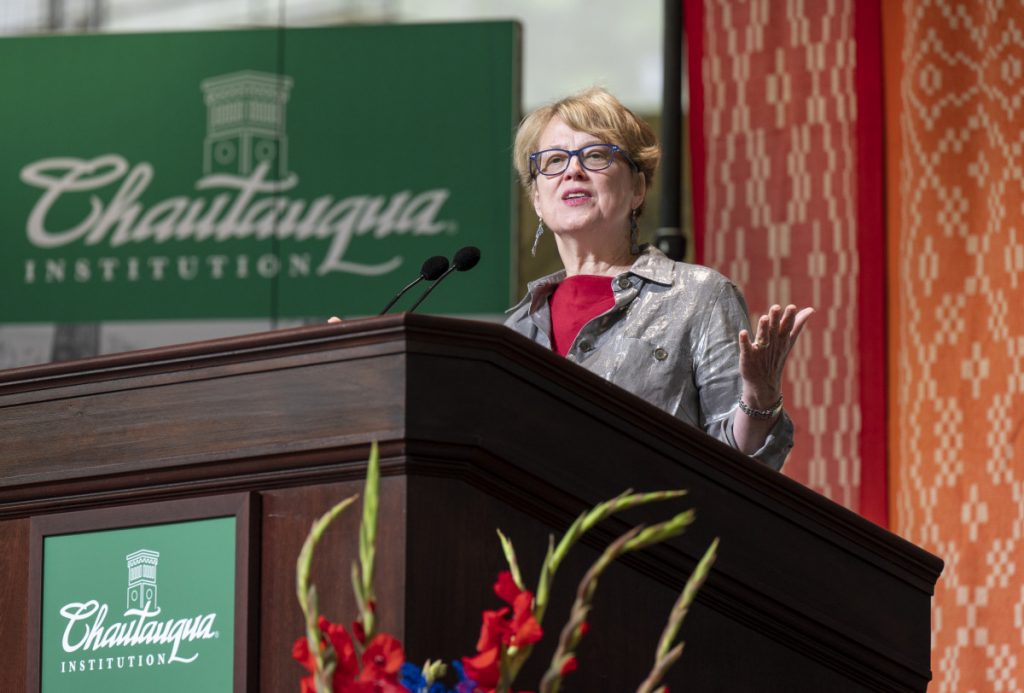
You can’t know what lies beneath something until it is uncovered, the Rev. Katharine Rhodes Henderson explained by describing a home renovation. She didn’t know there was a squirrel living within her walls, but discovered the truth when the wall was knocked down and the squirrel rushed out.
She used this analogy to demonstrate the uncovering of inequities and challenges in both the United States and world — particularly white Christian nationalism, race and climate change.
At 1 p.m. Monday, July 5 in the Amphitheater, Henderson presented her lecture, “Living Between Precarity and Promise,” part of Week Two’s Interfaith Lecture Series themed “New Frontiers: Exploring the Future of Religion in America.”
Henderson has been president of Auburn Theological Seminary, a 203-year-old multifaith, multirace leadership development and research institute in New York, for more than a decade.
She began by looking forward to five years from now, when the U.S. will celebrate its 250th anniversary, and asking what the world should look like then. First, she described issues posed by white Christian nationalism, noting the Jan. 6 insurrection of the U.S. Capitol.
People participating in the insurrection believed they were waging a holy war, using that to justify their actions, Henderson said.
“In the eyes of many, including young people leaving organized religion, there is no distinction between Christianity and nationalism, because of what they see,” she said.
Henderson argued that there is a distinction — Christian nationalism represents more than religion by including assumptions of nativism, white supremacy, patriarchy and heteronormativity. It asks the question of who an American is, a worthy question following the July 4 weekend, she said.
Christian nationalists believe white, native-born Christians are Americans, and exclude racial minorities and other religions, like Islam, she said.
“They are defining who we are as Americans by defining who we are not,” she said.
Henderson said the narrative of Christianity in the U.S. needs to be disrupted because its foundation lies in slavery, and that people justified the practice using Christianity. Wise teachers of different religions who have a shared vision of justice, equity and love and are committed to those who are vulnerable can help change this narrative, she said.
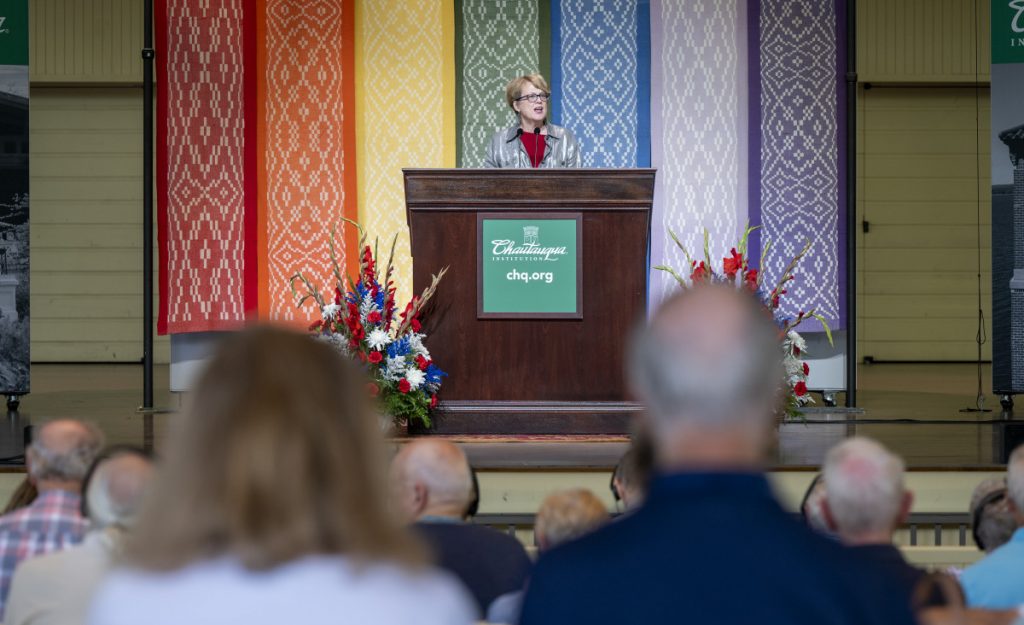
She also noted the underlying question of what it means to be an American.
“We can’t assume there are shared understandings,” she said.
At a time when Christian nationalism is shaping policies and has increased media attention, she said it is important that answers to that underlying question shape responses and actions, and that we shouldn’t work toward a future constructed by Christian nationalists.
The answer, to Henderson, lies in reclaiming the principle of religious freedom granted in the First Amendment. She said implementation of freedom in the U.S. has been contradictory from its beginning, noting that only white men were allowed to vote.
“There is a certain irony to it, because the principle has been, and continues to be, abused and misinterpreted from all sides,” she said.
Henderson has hope. She mentioned a nondiscrimination bill in Mesa, Arizona, aimed at accommodating transgender people in hotels. The Church of Jesus Christ of Latter-day Saints, commonly known as the Mormon church, wrote in support of this bill, she said.
Family is at the center of Mormonism, she said, and as people (particularly young, LGBTQ+) leave due to not feeling represented or accepted, the Mormon church wants to broaden its circle of acceptance.
“I was amazed,” she said. “This defied my presuppositions about Mormonism.”
Henderson then turned to race, saying the U.S. was founded on white supremacy.
“It was and continues to be an organizing principle and part of our DNA,” she said.
Henderson acknowledged economic disparities, heightened by COVID-19, as Jeff Bezos made billions from midnight spending on Amazon.com while others couldn’t eat, lost homes or became sick, she said.
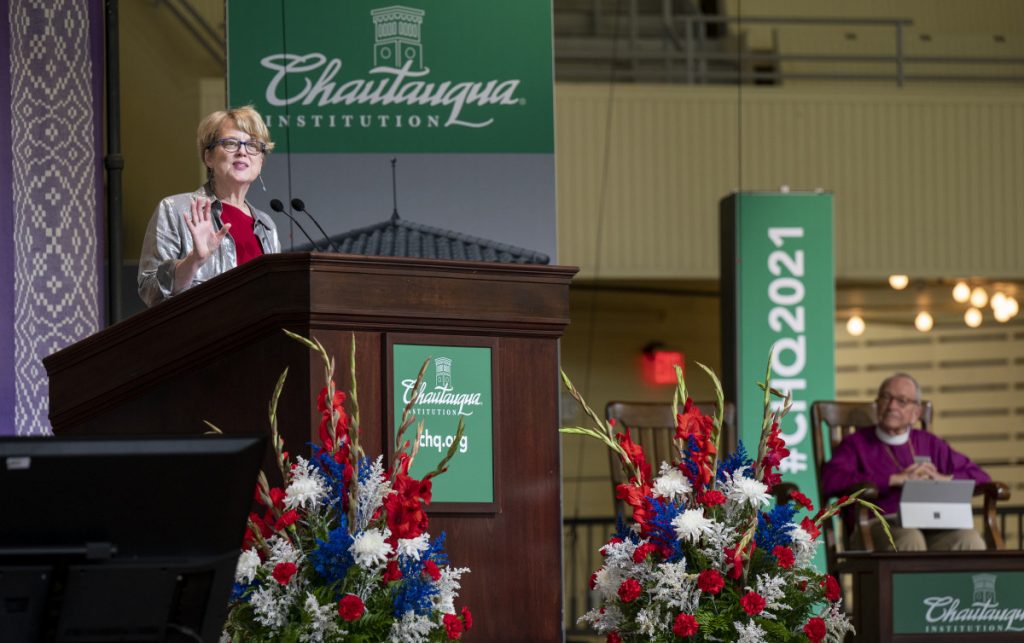
She gave an example of racism in local communities, too. In West Point, Mississippi, two women of color were named valedictorian and salutatorian in the class of 2021. Instead of celebrating, they ended up sharing the titles with white classmates after white parents protested the school, and the principal gave in.
Across the country, Henderson said 400 bills have been introduced to make voting harder for minorities and consolidate partisan power over an election. She said people only know George Floyd’s name because somebody filmed his death and published it to the internet, while there are too many names to remember of people killed by police.
Henderson said that Auburn Seminary leaders have spent time looking at the history of their institution. They’ve learned that it was built on stolen land from the Iroquois people, she said. Moreover, a textbook described that place and period in time as a wild and godless region, words she herself used early on in her presidency.
“We need to contemplate acts of repair and redemption,” she said. “Reparations was one of those words you couldn’t even say a couple years ago without invoking defensiveness. But it’s much more common as we move forward.”
Henderson gave a few more examples of reparations by institutions and people.
She said she was encouraged by the story of Virginia governor Ralph Northam, who was associated with a picture of him in blackface and another person in a Ku Klux Klan costume in his yearbook from Eastern Virginia Medical School.
When that transpired, she thought he should have resigned, she said. But then, Northam began working with Black mayors and leaders across Virginia and changed his administration’s direction. Northam’s administration banned the death penalty, allocated funds to historically Black colleges, implemented police reform measures and removed Confederate monuments.
A cynical perspective would have one assume he did this for political purposes, Henderson said, but she takes him at his word.
“It’s a story laced with all those theological words like redemption and forgiveness, learning and repayment of a debt,” she said.
Good intentions are no longer sufficient, Henderson said, and to grow a circle of belonging, people must have difficult conversations. She advised people to pick one issue that is most heartbreaking to them and learn and engage with it as much as they can.
“Whose voices are you listening to?” she said. “Who is most impacted? Who is missing? What can you learn? What can we learn? Talk to people, have those hard conversations. Bring it to your religious communities. Give money. Vote. Find the partners who are doing the work and go to work there.”
Henderson then turned to climate change, comparing lessons there to those from the COVID-19 pandemic.
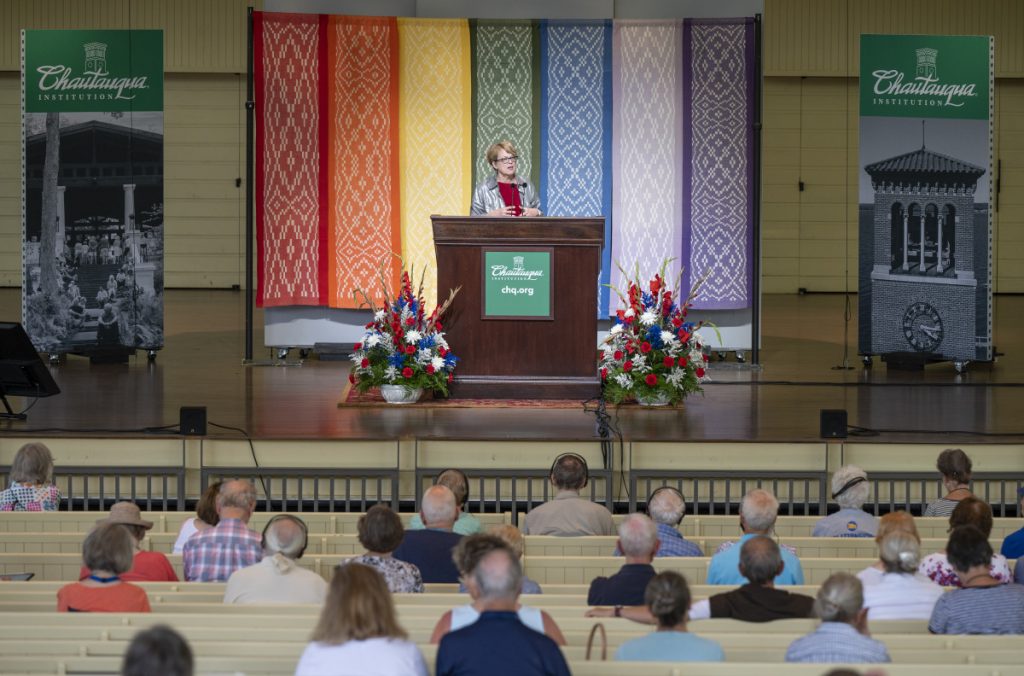
“It laid us low and humbled us,” she said. “It reminded us we are all intimately connected.”
She said environmental and racial justice are linked in that our relationship with the environment has been tainted by colonization and theological rationalization.
She said humans see themselves as stewards of the environment, which puts people in the place of God.
During Henderson’s home remodel, she found snakeskins in her new pantry. Days later, she found another in the same spot.
Before COVID-19, Henderson said, she would have rushed to pour cement over every hole in the house to prevent the snake from returning. Instead, she admired the snake’s patterns and body memory, always returning to its favorite spot to shed, and was grateful it didn’t reveal itself while she was around. She said she wouldn’t have been able to form this perspective without the pandemic.
With regard to climate change, Henderson said people aren’t persuaded by facts or data, but rather by feeling a sense of belonging and connection. She said having conversations with one another is more persuasive.
One way Henderson feels connected is with her tattoo of a mandala on her forearm, with a circle in which there’s a tree of life, she said. The tattoo has roots in a red thread, which she said symbolizes humans’ lifeblood is connected with nature.
This meaning has changed for her over time. When she went to a memorial for Black people lynched in this country, in Montgomery, Alabama, where she realized her tattoos represented not only her original intent, but also the lynching tree and the blood of ancestors.
She realized her tattoo represents her expanding circle of belonging and connection.
“We carry each other,” she said. “We’re all accountable to one another. We have to hold each other tight.”
As she leaves Auburn Seminary later this year, Henderson said she is looking forward to seeing and working with people marching in streets, online or singing at Chautauqua.
“I look forward to working with you as people of faith and moral courage spread out all over the country to turn precarity into promise and polarization into possibility,” she said.



